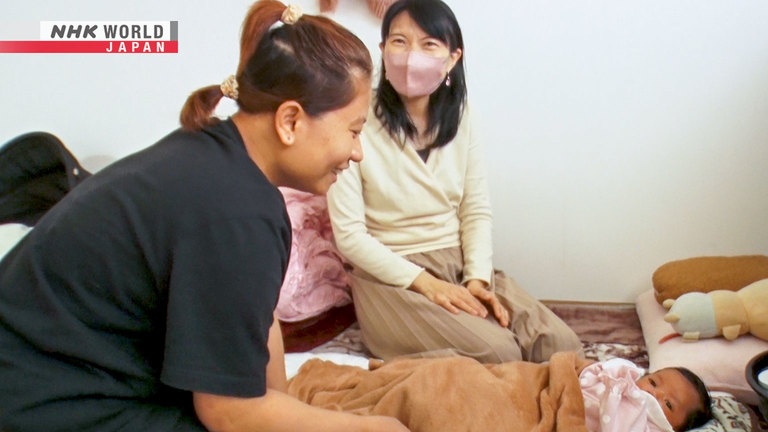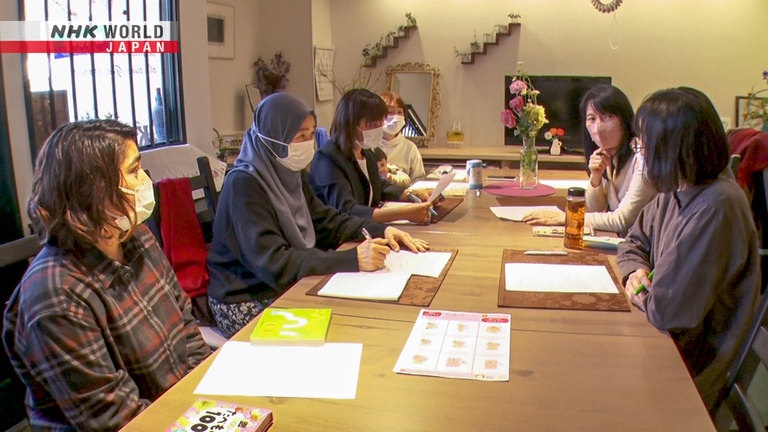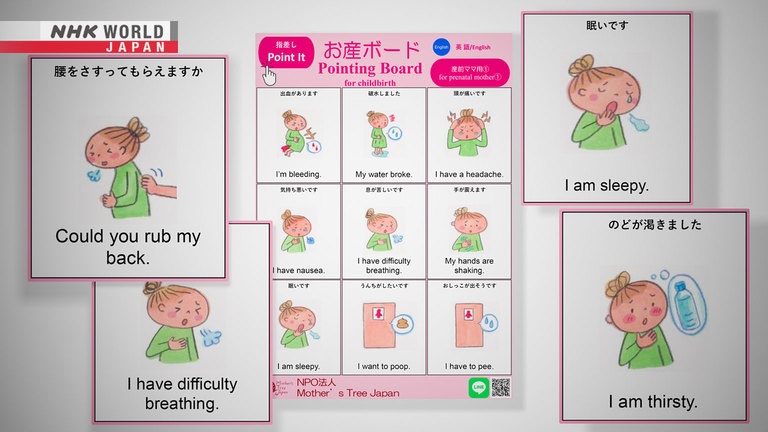Childrearing Beyond Borders
Giving birth and childrearing come with many worries, which can be magnified for mothers living in a country not their own. Luckily for those in Japan, Tsubonoya Tomomi, a seasoned nursery school teacher, founded an NPO devoted to helping non-Japanese moms overcome cultural and language barriers. We follow Tomomi in her work and learn about the philosophy behind her efforts.




Transcript
You did great!
Bringing a new life into the world is anything but easy.
And doing so in a country that's not one's own with cultural and linguistic barriers is even more difficult.
A group of people in Japan are here to provide support to mothers from abroad.
Their mission is to make it easier for women in Japan to give birth and raise their children,
no matter their nationality.
Let's get a closer look at their efforts.
Myanmar-born Ei Thandar Soe and her husband came to Japan as technical intern trainees in 2016.
Soe only speaks very simple Japanese and cannot read it.
This February, she gave birth to her daughter.
I gave her a name I liked: Eaint Chu Ka.
My mother says the name 'Eaint'
expresses the wish...
for happiness and peace
to come to our family.
One of the issues that preoccupy Soe is the many documents she receives.
Though they provide useful health-related information for her newborn, she cannot read them.
In Myanmar, mothers only get
a single document.
But here I received so many,
before and after giving birth.
Because of his work, Soe's husband lives in another area in Japan.
She must therefore take care of their infant daughter without him.
Luckily, she's not alone.
Hi!
And hello, Ka!
Dropping by for a visit is Tsubonoya Tomomi.
She leads an NPO that supports foreign mothers living in Japan.
From helping with paperwork to accompanying her during doctor's appointments,
she provides Soe with attentive and thoughtful assistance.
So cute!
- Do you get enough sleep?
- Not really.
You need to get up every two hours?
I can't do much on my own.
I speak too little Japanese.
I can't take care of all the paperwork.
But with Tomomi's help, I'm relieved.
Tomomi had seen many non-Japanese mothers getting passed around from one hospital to another due to language issues.
She knew she had to do something to help them.
Sue's previous doctor told
her to come back...
only after she learned to speak Japanese.
I bet it must've added
to your stress, Soe.
Of course, the language barrier
is a big issue.
But mothers also need someone
who listens to them...
and can be by their side.
It's a source of strength.
In her childhood and early teens, Tomomi lived in Hong Kong and the UK.
She says she'll never forget how her mother who couldn't speak
the local language struggled to raise her and her older sister.
Later, Tomomi worked at a nursery school in Japan where she witnessed firsthand
the lack of support for mothers from abroad.
When talking about their experiences
giving birth or raising their kids...
most of them cried.
It reminded me of my mother.
I realized the hardships foreign women
have to go through in Japan...
before and after giving birth.
And so, in 2020, she founded Mother's Tree Japan.
Now, the NPO is forty members strong,
with specialists like nursery school teachers, midwives and medical interpreters
providing support in 12 different languages.
They've helped more than 1,500 mothers so far.
They hold regular staff meetings.
Gathered today are volunteer interpreters.
Most of the NPO's members are Japanese mothers
who experienced giving birth abroad or foreign mothers living in Japan.
One of the fruits of their collaboration is a series of communication boards for mothers and mothers-to-be.
This one is for expecting mothers experiencing issues
that are too embarrassing or difficult to describe with limited Japanese ability.
They can simply point to the picture that corresponds to their problem,
such as their water breaking or any physical pain.
Today, they're discussing ways to improve the boards' usability.
One of the big topics right now is weight control.
Some gain weight even if they
don't want to, then get scolded.
Women often ask if they really need
to limit their food intake.
I tell them Japan's method increases
the chances of an easy delivery.
So, it's really worth giving it a try.
Like, 'Your country's method is fine,
but the Japanese way is good, too.'
Yes, don't say their way's wrong.
The staff members themselves are busy with childrearing,
but they proactively take part in the NPO's activities.
It's hard to juggle my job,
volunteer work and raising my son.
But I want to continue this work,
and contribute even more.
I want to do more than just simply
translate what people say as is.
I try to convey the feeling that I care
about the people for whom I translate.
That's what I aim for when I interpret.
Working together, Tomomi and her staff have nurtured a philosophy that guides them.
Mothers living in a country not their own
can feel some anxiety.
We try to be by their side, and encourage
them to talk freely about their worries.
I believe making them feel accepted
along with their culture...
is more important than language.
Tomomi has now started to create opportunities for the mothers
who receive support to meet and share experiences.
Attending the event today are mothers from Myanmar, Vietnam, France and Japan.
Meetings of this kind for the NPO had been difficult to hold due to restrictions against the pandemic.
Food here must be quite different
from that in your country.
Could each of you tell us about
how you manage with food here?
Oh, it's many years already.
I'm vegetarian.
She says because she's vegetarian
it's difficult to get enough iron.
Iron pot?
She says she uses a cast iron pot
to boil water...
and get the iron
a pregnant woman needs.
No matter what dishes you eat, it's good
to add plenty of fruit and vegetables...
to get enough vitamins and minerals.
The experience of talking with mothers from different countries can benefit Japanese moms, too.
In Japanese-only groups, I end up
comparing myself to others...
and wonder if I'm doing it right.
But here, I don't need to worry so much.
I can look at childrearing
in a freer, more open way.
Many people see efforts to be
more multicultural...
as something to help foreigners here.
But in fact, it's also for us Japanese.
Different ways of thinking can enrich
our lives and give birth to new values.
So, it's really exciting to exchange
with people from other countries.